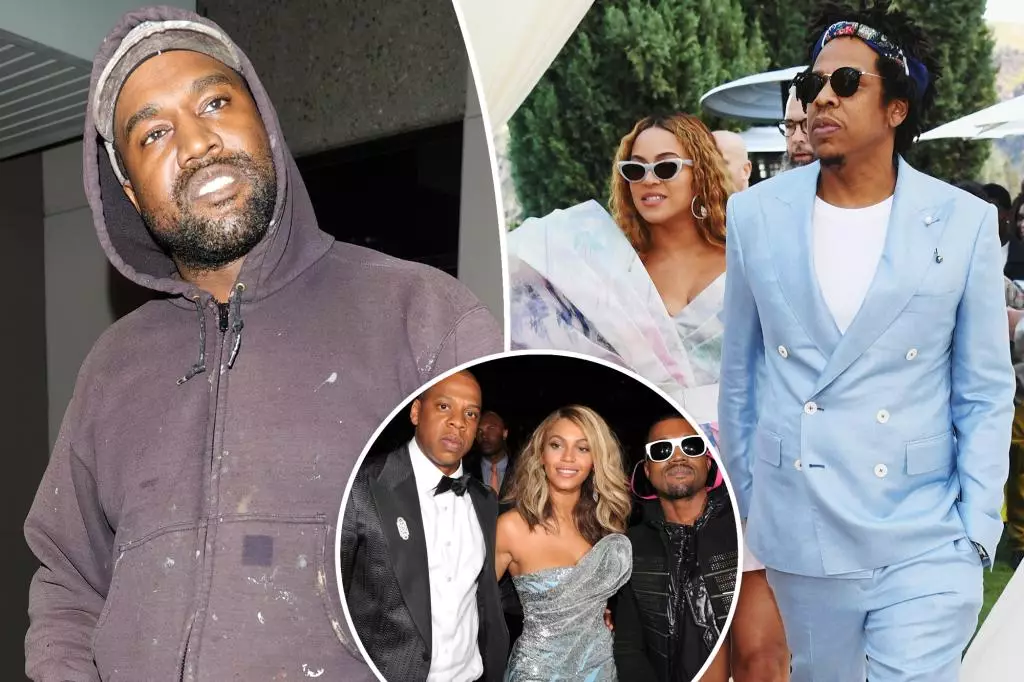Recently, the music world was shaken by yet another chapter of Kanye West’s ongoing saga of controversial public statements, particularly regarding the well-known couple, Beyoncé Knowles and Jay-Z. In a spontaneous eruption of feelings, West expressed remorse for what he described as an inexplicable attack on their young children, Sir and Rumi. The follow-up to this admission, however, hints at a deeper unrest within him—a tumult bordering on the tragic that illustrates fragility within the glittering facade of fame. It’s a glaring reminder that the dynamics of celebrity relationships are often more convoluted than they appear.
West’s emotional vulnerability in stating, “I LOVE JAY Z AND I DO FEEL BAD,” hints at a complex mix of admiration and jealousy that has characterized his relationships throughout the years. The admission comes packed with a sharp tang of betrayal; while Kanye publicly lauds his colleagues, his lyrics and erratic outbursts tell a different story. Diving into the crux of his allegations, he points fingers at the Carters, suggesting their absence during pivotal moments in his life, such as his wedding to Kim Kardashian or key performances. This beguiling interplay of loyalty and disappointment underscores a desperate longing for familial connection in a world where he perceives himself as the proverbial black sheep.
The Weight of Isolation in Stardom
One can’t ignore the irony in West’s claims of feeling “slighted.” As an artist who enjoys the limelight and fully exploits the advantages it brings, the paradox of seeking validation from figures like Jay-Z and Beyoncé while simultaneously positioning himself as an instigator of chaos is striking. It reflects an internal struggle: how does one balance the clandestine desires for acceptance with the public image of the untouchable maverick? His proclamations expose the stark contrast between the surface glamour of celebrity life and the raw emotions swirling beneath—a potent reminder that fame often comes at the hefty price of loneliness.
Moreover, his assertion that the Carters could have leveraged their influence to assist him matters deeply. It points to a yearning for camaraderie and support that seems to go unreciprocated. West’s claims indicate that he believes the celebrity circle should be a sanctuary; instead, it acts as a double-edged sword, leaving him exposed to his insecurities. Here lies an intrinsic tragedy—where friends are once supportive collaborators, they can devolve into sources of pain and jealousy, magnifying life’s trials in a most public way.
Self-Destruction and Backtracking
The impact of social media in this narrative is undeniable. West’s rapid-fire tweets—each oscillating between regret and aggression—serve as a vivid testament to the complexities of modern celebrity discourse. His retraction of the hurtful statement about Beyoncé’s children, framed under the guise of self-preservation, reveals an awareness of potential repercussions. It begs the question: is there a genuine sense of morality within his outbursts, or is it just a calculated maneuver to manage his public persona? This duality is not just perplexing; it showcases the tension that arises when art meets personal identity.
When he states that he removed the offensive tweet not out of remorse, but as a tactic to avoid social media backlash, it exposes a troubling aspect of his character—one that seems willing to sacrifice moral integrity for public favor. This incessant need for validation often leads to a cycle of self-destruction—a cautionary tale for anyone yearning for acceptance in high-stakes arenas.
Beyond the Disputes: Cultural Stakes
The complexity further compounds when considering the cultural ramifications of West’s statements. By targeting children—an intersectional group that often remains shielded from celebrity clashes—he holds a mirror to the deeper societal discourse on accountability, responsibility, and the weight of influential figures within the cultural zeitgeist. If artists like West can tear through public personas to reveal vulnerabilities, what does this mean for the next generation of creatives who might follow in their footsteps?
Though the conflict appears to stem from West’s personal grievances against Jay-Z and Beyoncé, it also raises broader questions about the obligations that come with cultural prominence. The Carters are paragons of success within the entertainment sphere; yet here, they become embroiled in West’s emotional storm, illustrating how interconnected personal rivalries and community responsibilities are entwined in the industry.
In essence, West’s tirades, laden with feelings of betrayal and cries for validation, reveal a stark reality of celebrity culture—one where the boundaries between personal and public life are increasingly foggy. The ripple effects of such emotional outbursts extend far beyond personal feelings, prompting a reflection on the ethics of fame itself.


Leave a Reply